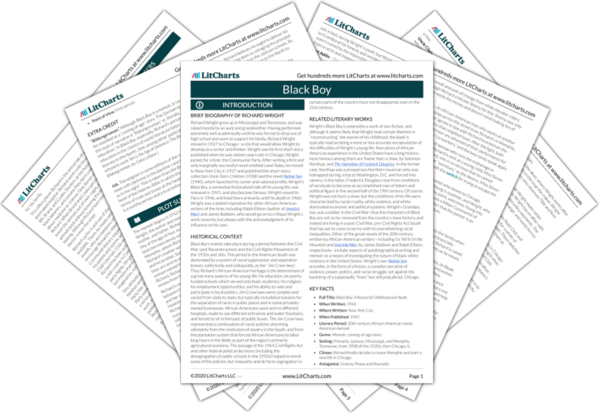Black Boy details Wright’s physical discomfort and privation in both the South and in the North. Many characters in the memoir also suffer, because African-American families in the white-dominated US often cannot access proper food, medicine, and other necessities.
Wright is hungry for much of the memoir. Early on, Wright’s father refuses to pay alimony. Wright and his brother must live on their mother’s meager salary, earned cooking for white families. Although Wright’s mother works in a kitchen, Wright must eat mush, very little meat or bread, and almost no fruits or vegetables. Later, when his mother becomes ill, Wright moves in with his grandmother in Jackson. There, his diet improves slightly, but he still does not eat enough to feel satisfied. Hunger becomes one of the dominant emotional states of his young life. It captures the pain of Southern racism, and Wright’s gnawing desire to escape his surroundings. He does everything he can to fill his stomach, including drinking water to simulate fullness.
In Memphis, Wright limits his food intake to hamburgers, peanuts, and beans from a can. Now, Wright has enough money to eat better, and Mrs. Moss, whom he boards with, is willing to feed hi—but Wright wants to save money for his trip North. He does not want to depend on anyone else’s food, since he believes it is important for a man to “make his own way.” Wright’s hunger continues through the end of the memoir’s first part, when a white man approaches him in the eyeglass shop and offers him a dollar, saying Wright has the look of a starving man. But Wright will not accept the money from the white Northerner—showing that Wright’s pride and self-reliance are more important than his physical needs, even in desperate times.
Others in the memoir experience physical torment. Wright’s mother has a series of paralyzing strokes, causing her extreme pain. After several years, it becomes clear that she will never recover fully, and Wright will have to support the family. Grandpa, a veteran of the Civil War, is ill for years, and is denied health coverage because a white officer misreported his name on an official report. Older family members often beat Wright. He learns quickly that white families would just as soon kill black children they believe to be “criminals.” Wright learns about lynching, the extra-legal killing of black men in the South, and is terrified of this vigilante injustice.
The only possibility for alleviation, Wright concludes, is a move to Chicago. There, Jim Crow laws are not in effect, and members of black society have at least a nominal chance at equal rights. Although Wright does not believe that Chicago will be paradise, in Jackson and in Memphis he sees what servitude, violence, and deprivation can do to black society. In Chicago, Wright still goes hungry, and he struggles to find an apartment big enough for his family. But his work prospects improve somewhat, and he’s able to eat enough to maintain the weight required for the Postal Service. By the end of the memoir, Wright’s hunger has transformed. It is no longer a simple physical need—though he could always eat more. Instead, Wright yearns for intellectual nourishment, the kind one gets from reading deeply, writing, and finding political community.
Hunger, Illness, and Suffering ThemeTracker













